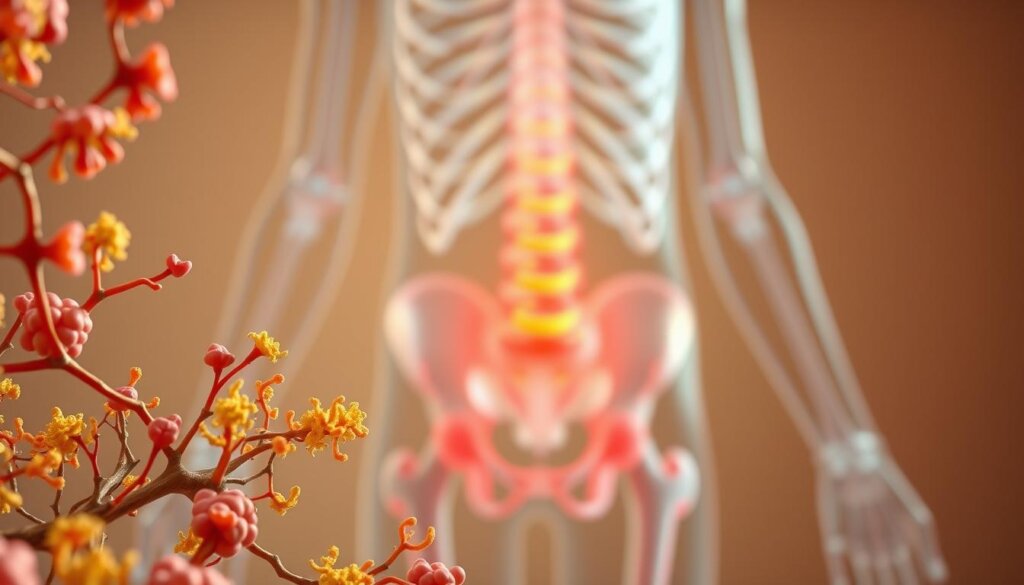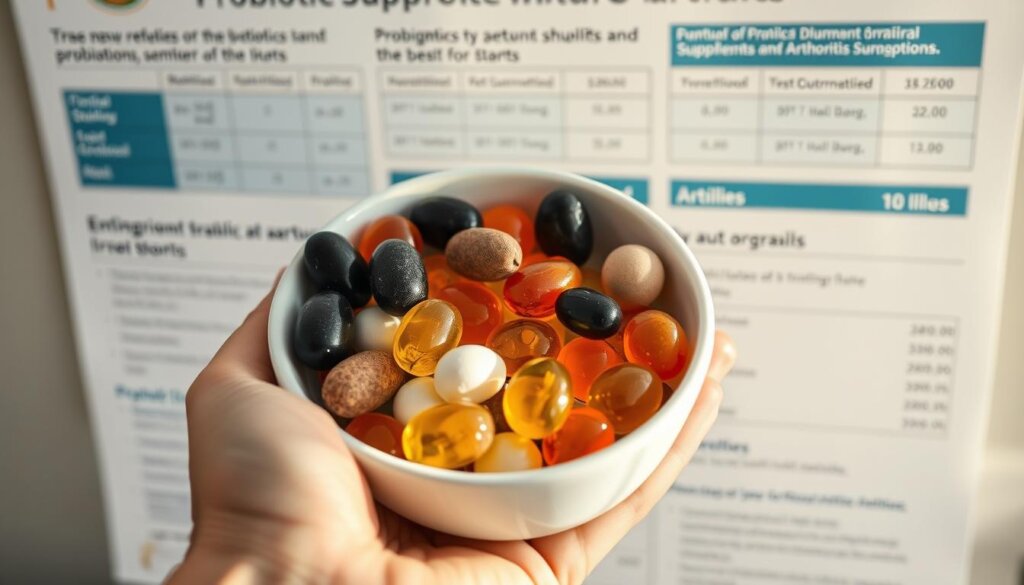What if balancing your digestive system could help soothe achy joints? Emerging research reveals a surprising link between the trillions of microorganisms living in our bodies and inflammatory conditions affecting millions worldwide. This connection offers new hope for those seeking natural approaches to support their well-being.
Living bacteria found in fermented foods like yogurt and kimchi play a crucial role in maintaining health. These microscopic allies help regulate immune responses and may influence inflammation levels throughout the body. For individuals navigating joint-related challenges, this discovery opens exciting possibilities.
Scientists now recognize that our digestive ecosystem impacts far more than just nutrient absorption. A balanced gut environment appears to communicate with other systems, potentially creating ripple effects that reach our joints. This understanding has sparked global interest in dietary strategies that support both digestive and musculoskeletal benefits.
Key Takeaways
- Gut health significantly influences inflammatory responses throughout the body
- Fermented foods and supplements offer different ways to support microbial balance
- Specific bacterial strains show promise for reducing inflammation markers
- Immune system modulation may explain observed joint health improvements
- Personalized approaches yield better results than one-size-fits-all solutions
Wellness Group combines cutting-edge science with practical guidance, helping people explore these natural solutions safely. Through this comprehensive guide, discover how modern nutritional insights might transform traditional approaches to maintaining mobility and comfort.
Understanding Arthritis and Gut Health
Joint discomfort affects over 10 million people in the UK alone, with many experiencing reduced mobility. While arthritis comes in different forms, most cases involve either mechanical wear (osteoarthritis) or immune-driven inflammation (rheumatoid arthritis). Researchers now observe a pattern: those with inflammatory joint conditions often show digestive system irregularities.
Arthritis: Inflammation and Immune Response
Inflammatory arthritis occurs when the body’s defense mechanisms mistakenly attack healthy tissues. This overactivity creates swelling and stiffness in joints. Osteoarthritis, though primarily mechanical, still involves some inflammatory processes as cartilage breaks down.

The Gut Microbiome Connection
Trillions of microorganisms reside in human intestines, forming a complex ecosystem. Studies reveal that imbalances here may trigger immune responses affecting distant joints. Increased intestinal permeability – often called “leaky gut” – allows bacterial fragments to enter blood circulation, potentially worsening inflammation.
| Arthritis Type | Primary Cause | Inflammation Level | Gut Involvement |
|---|---|---|---|
| Osteoarthritis | Joint wear | Mild | Indirect |
| Rheumatoid | Autoimmune | High | Direct |
| Psoriatic | Immune dysfunction | Moderate | Emerging evidence |
This microbial community communicates with immune cells through chemical signals. When harmful bacteria dominate, they may activate pathways that increase systemic inflammation. Maintaining diverse gut flora could help modulate these reactions, offering a natural approach to joint comfort.
How Probiotics Can Aid in Managing Arthritis Symptoms
Recent scientific breakthroughs are shedding light on natural approaches that complement traditional joint care methods. Exciting discoveries reveal how specific bacterial strains might influence inflammatory responses linked to joint discomfort.

Clinical Studies and Evidence
A landmark 2014 trial published in Nutrition followed 46 individuals with rheumatoid arthritis. Participants receiving Lactobacillus casei supplements showed measurable improvements in inflammation markers compared to the placebo group within eight weeks.
Scientists observed reduced swelling and stiffness in joints among those taking probiotics. “These findings suggest microbial supplements could enhance existing treatment plans,” noted researchers, while emphasizing the need for further investigation.
Benefits for Joint Health
Specific strains like Bacillus coagulans demonstrate particular promise. Multiple studies report:
- 30% reduction in self-reported pain scores
- Improved mobility in 65% of rheumatoid arthritis patients
- Fewer tender joints compared to control groups
Emerging research indicates these beneficial microbes may help regulate immune activity. While not a standalone solution, they show potential as supportive elements in comprehensive care strategies.
Current investigations explore optimal dosing and strain combinations. As evidence grows, many healthcare providers now consider microbial balance when addressing inflammatory conditions.
The Science Behind Probiotics and Inflammation
Imagine your gut as a control center communicating with every part of your body. Research shows microbial balance directly impacts how our systems respond to threats. This relationship holds particular significance for those exploring natural ways to address persistent inflammation.
Mechanisms of Action
Beneficial bacteria work through three primary pathways. First, they outcompete harmful microbes for resources. Second, they produce compounds that neutralize toxins. Third, they stimulate immune cells to maintain balanced responses.
| Mechanism | Function | Impact |
|---|---|---|
| Microbial Competition | Limits harmful bacteria growth | Reduces infection risks |
| Compound Production | Creates anti-inflammatory substances | Lowers CRP levels |
| Immune Modulation | Trains defense cells | Prevents overactive responses |
Reducing Intestinal Permeability and Enhancing Immunity
A healthy gut lining acts like a security system. When compromised, undigested particles enter the bloodstream. Probiotics strengthen this barrier, preventing “leaks” that trigger widespread inflammation.
Studies reveal specific strains increase tight junction proteins by 42%. This fortification helps the immune system focus on real threats rather than false alarms. As noted in Gut Microbes Journal: “Microbial diversity serves as the foundation for targeted immune education.”
Regular intake of probiotic-rich foods supports this process. Over time, the body becomes better at distinguishing between harmful invaders and harmless substances. This calibration proves especially valuable for managing chronic inflammatory conditions.
Integrating Probiotics into a Healthy Diet for Arthritis Relief
Small dietary changes can make a big difference in supporting joint comfort. By focusing on gut-friendly nutrition, individuals may enhance their body’s natural defenses against inflammation.
Probiotic-Rich Food Sources
Fermented options offer delicious ways to nourish the gut microbiome. Consider these everyday choices:
| Food | Key Benefit | Serving Idea |
|---|---|---|
| Yogurt | Contains live cultures | Morning smoothie base |
| Kimchi | Rich in fiber | Rice bowl topping |
| Tempeh | Plant protein source | Stir-fry ingredient |
| Kefir | Lactose-friendly | Afternoon snack drink |
Start with small portions to allow digestion to adjust. Pair fermented items with whole grains or fresh vegetables for balanced meals.
Supplements and Dosage Guidelines
When food sources aren’t enough, quality supplements can fill nutritional gaps. Look for products with:
- Minimum 1 billion CFU per dose
- USP verification seal
- Strain specificity (e.g., Lactobacillus)
For those with digestive concerns, gradual introduction helps minimize discomfort. Most experts recommend taking supplements with meals for better absorption.
Combine these strategies with anti-inflammatory foods like berries and leafy greens. This dual approach supports both microbial balance and joint health through smart nutrition choices.
Wellness Group's Approach and Business Information
Navigating joint health challenges requires personalized strategies that address both physical comfort and overall health. Wellness Group combines scientific insights with compassionate care, offering solutions tailored to individual needs. Their team focuses on enhancing quality of life through balanced approaches that complement traditional therapies.
Consultation and Support for Arthritis Care
Wellness Group’s experts provide guidance rooted in the latest research on gut-joint connections. They help clients explore dietary adjustments, including options for improving digestive health, which may influence systemic inflammation. Each plan prioritizes sustainable habits rather than quick fixes.
Business Hours and Contact Info
Available Monday through Friday from 9:30 AM to 6:30 PM, the team welcomes inquiries via WhatsApp at +60123822655. Whether seeking advice about immune system support or general wellness strategies, they assist people in making informed choices for long-term joint comfort.
FAQ
Can gut bacteria influence rheumatoid arthritis flare-ups?
Research suggests an imbalanced gut microbiome may trigger immune responses linked to joint inflammation. Beneficial bacteria like Lactobacillus and Bifidobacterium strains could help regulate these reactions, potentially reducing flare-ups.
What dietary changes support probiotic benefits for joint health?
Pairing probiotic-rich foods like kimchi or kefir with anti-inflammatory ingredients—such as leafy greens, fatty fish, and berries—enhances their effects. Avoiding processed sugars and trans fats also helps maintain a balanced gut environment.
Are probiotic supplements safe for arthritis patients?
Most studies show probiotic supplements are safe when taken as directed. However, consulting a healthcare provider is crucial, especially for those on immunosuppressive therapies or with chronic conditions like inflammatory bowel disease.
How long does it take to notice improvements in symptoms?
Results vary, but some individuals report reduced stiffness or swelling within 4–8 weeks. Consistency with diet, supplements, and lifestyle adjustments plays a key role in achieving long-term benefits.
Can probiotics replace traditional arthritis treatments?
No. While they may complement therapies by lowering inflammation, probiotics should not replace prescribed medications. Always discuss integrative approaches with a rheumatologist or nutrition specialist.
Does Wellness Group offer personalized nutrition plans for arthritis?
Yes! Wellness Group provides tailored dietary guidance, including probiotic integration and anti-inflammatory meal strategies. Reach out via WhatsApp at +60123822655 to schedule a consultation.
What role does intestinal permeability play in joint pain?
A “leaky gut” may allow toxins to enter the bloodstream, triggering systemic inflammation. Probiotics strengthen the gut lining, which could lessen this immune response and ease discomfort in joints.
Are fermented foods sufficient, or are supplements necessary?
Fermented foods like yogurt and sauerkraut are excellent sources, but supplements offer concentrated doses of specific strains. Combining both often yields optimal results for gut and joint health.
How does stress impact gut health and arthritis?
Chronic stress disrupts the gut microbiome, worsening inflammation. Mindfulness practices, paired with probiotics, may improve resilience against stress-related flare-ups.
What’s the best time to take probiotic supplements?
Taking them with meals improves survival through stomach acid. Morning or evening routines work equally well—consistency matters more than timing for long-term benefits.






